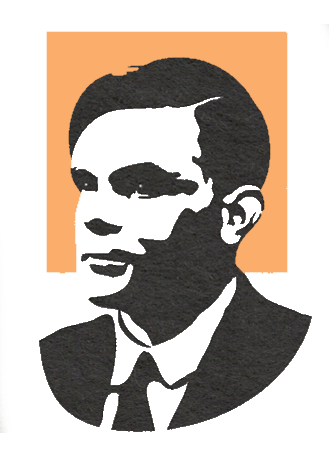 Ada Lovelace is regarded by some in the scientific community as a socialite and sort of Girl Friday to Charles Babbage, whose contributions to the development of computers and programming was minimal. That unfair characterisation is happily on its way out, thanks in part to the championing of another one of history’s discounted, cryptographer Alan Turing who suffered horrid muckraking, who helped to revive Lovelace’s name and reputation because Turing, having rediscovered one of her all but forgotten treatises, was compelled to profoundly disagree with her miraculous stance, formulated eighty years before, holding that machines could do what we were capable of ordering them to do but did not think for themselves. Turing begged to differ and was behind some of the theories that would lead to the study and concept of artificial intelligence. This aside, of course, was just of hint of the scope of Lovelace’s conceptual leap that would elevate the computer above the steam-powered abacus it was designed to be to what we do and how we think about modern, general-purpose computing.
Ada Lovelace is regarded by some in the scientific community as a socialite and sort of Girl Friday to Charles Babbage, whose contributions to the development of computers and programming was minimal. That unfair characterisation is happily on its way out, thanks in part to the championing of another one of history’s discounted, cryptographer Alan Turing who suffered horrid muckraking, who helped to revive Lovelace’s name and reputation because Turing, having rediscovered one of her all but forgotten treatises, was compelled to profoundly disagree with her miraculous stance, formulated eighty years before, holding that machines could do what we were capable of ordering them to do but did not think for themselves. Turing begged to differ and was behind some of the theories that would lead to the study and concept of artificial intelligence. This aside, of course, was just of hint of the scope of Lovelace’s conceptual leap that would elevate the computer above the steam-powered abacus it was designed to be to what we do and how we think about modern, general-purpose computing.
 Charles Babbage’s most famous contributions to computing, the Difference Engine and the Analytic Engine, were inestimably important but both were never completed, and I suppose that it could be argued that Babbage invented the computer in the same sense that Leonardo invented the helicopter, but were consigned with the express purpose of correcting errors in mathematical tables, long schedules of logarithmic and exponential functions used for scientific, navigation and engineering applications, like projecting population growth, measuring magnitudes of change, interest rates, and radioactive decay—whose functions were figured by humans and fallible and those errors spread widely enough caused much frustration. Lovelace, though it was probably not well understood at the time since there were no words or concepts for programming, debugging and algorithms back then, was even more a visionary than the mechanically-inclined Babbage. Purposefully estranged from her father, poet Lord Byron, by her jilted and somewhat domineering mother, so Lovelace might not inherit her father’s disturbing temperament, the young Ada’s education had strong emphasis in logic and mathematics, but despite (and because) of her mother’s best efforts, Lovelace seemed to have a keen balance of the arts and sciences—enabling her to see potential beyond mere number-crunching.
Charles Babbage’s most famous contributions to computing, the Difference Engine and the Analytic Engine, were inestimably important but both were never completed, and I suppose that it could be argued that Babbage invented the computer in the same sense that Leonardo invented the helicopter, but were consigned with the express purpose of correcting errors in mathematical tables, long schedules of logarithmic and exponential functions used for scientific, navigation and engineering applications, like projecting population growth, measuring magnitudes of change, interest rates, and radioactive decay—whose functions were figured by humans and fallible and those errors spread widely enough caused much frustration. Lovelace, though it was probably not well understood at the time since there were no words or concepts for programming, debugging and algorithms back then, was even more a visionary than the mechanically-inclined Babbage. Purposefully estranged from her father, poet Lord Byron, by her jilted and somewhat domineering mother, so Lovelace might not inherit her father’s disturbing temperament, the young Ada’s education had strong emphasis in logic and mathematics, but despite (and because) of her mother’s best efforts, Lovelace seemed to have a keen balance of the arts and sciences—enabling her to see potential beyond mere number-crunching.
Sunday 18 January 2015
calculated passion
Saturday 17 January 2015
focus-pocus
a specimen of the cashiers’ receipt
catagories: 📯, 🥸, environment
the yellow nineties or zero shades of grey
 I listened to a delightfully funny and engrossing panel-discussion on the controversial but probably well-understood artist Aubrey Beardsley. Forever twined with the scandals of Oscar Wilde—though professionally, the two always tried to distance themselves, fearing their individual and different flairs might be cancelled out as a talent combined, Beardley’s prints were repulsively erotic and decadent, debauched and corrupting, and despite sensibilities that have grown a bit more tolerant and receptive, I think the black and white illustrations still shock and still nudged underground, despite the brilliance of the artistry, and have no place in polite society. Indeed, looking at them, one does have a sense of having uncovered something supremely smutty and checks to make sure that no one is looking over one’s shoulder. Many times there are surprisingly lurid doodling details hidden in the loops and swirls.
I listened to a delightfully funny and engrossing panel-discussion on the controversial but probably well-understood artist Aubrey Beardsley. Forever twined with the scandals of Oscar Wilde—though professionally, the two always tried to distance themselves, fearing their individual and different flairs might be cancelled out as a talent combined, Beardley’s prints were repulsively erotic and decadent, debauched and corrupting, and despite sensibilities that have grown a bit more tolerant and receptive, I think the black and white illustrations still shock and still nudged underground, despite the brilliance of the artistry, and have no place in polite society. Indeed, looking at them, one does have a sense of having uncovered something supremely smutty and checks to make sure that no one is looking over one’s shoulder. Many times there are surprisingly lurid doodling details hidden in the loops and swirls.
 It’s hard to find a modern analogue, I think, because Beardsley was apolitical, though importantly challenging society’s dirty little secrets and however disgusting one might find the pictures everyone intuited exactly what they were about, but maybe John Waters and his troupe of Dreamlanders (Divine, Mink Stole, Patty Hearst and Traci Lords) in transgressive films like Mondo Trasho, Pink Flamingos, Hairspray and A Dirty Shame maybe comes close. Beardsley’s sketches are quintessentially Art Nouveau but I did not realise that his foundry was really the propagating force behind the style, contributing-editor to a quarterly magazine devoted to graphic design (the publication was bound in a yellow cloth cover, hence the name of the decade that vied with the other designation, the Gay Nineties). Moreover the cultural-exchange between Japan and England, whose woodcuts strongly influenced the young artist, and the way that the style that typified the era was reimported and reinterpreted is fascinating to consider.
It’s hard to find a modern analogue, I think, because Beardsley was apolitical, though importantly challenging society’s dirty little secrets and however disgusting one might find the pictures everyone intuited exactly what they were about, but maybe John Waters and his troupe of Dreamlanders (Divine, Mink Stole, Patty Hearst and Traci Lords) in transgressive films like Mondo Trasho, Pink Flamingos, Hairspray and A Dirty Shame maybe comes close. Beardsley’s sketches are quintessentially Art Nouveau but I did not realise that his foundry was really the propagating force behind the style, contributing-editor to a quarterly magazine devoted to graphic design (the publication was bound in a yellow cloth cover, hence the name of the decade that vied with the other designation, the Gay Nineties). Moreover the cultural-exchange between Japan and England, whose woodcuts strongly influenced the young artist, and the way that the style that typified the era was reimported and reinterpreted is fascinating to consider.
Friday 16 January 2015
you deserve a break today
 I agree that many people may not understand the mathematical formulation and see the inequality symbol as broken computer code. Perhaps the confused can use this mind- bogglingly clever translation feature for smart phones, as one would for a foreign menu. Who are these Haters anyway? Are they shaming past patrons? The former advertising draughtsman even graciously offers a long list of alternate jingles.
I agree that many people may not understand the mathematical formulation and see the inequality symbol as broken computer code. Perhaps the confused can use this mind- bogglingly clever translation feature for smart phones, as one would for a foreign menu. Who are these Haters anyway? Are they shaming past patrons? The former advertising draughtsman even graciously offers a long list of alternate jingles.
catagories: ⚕️, 🍔, 📐, networking and blogging
churchillian drift
Mental Floss disabuses us of some of our favourite misattributed or completely made up great quotations with a studied collection of sayings that go rather deeply into the origins of those things we wish our heroes had said. One of the best stories is about how Abraham Lincoln supposedly proclaimed that “When you look for the bad in mankind expecting to find it, you surely will.”
 This wise if not somewhat Pollyanna-ish line comes to us not from the great statesman but rather via the marketing geniuses at Disney studios, producing a film version of the book Pollyanna, whence at the treacly and campy conclusion, the little heroine opens the locket of her dead father to discover this inscription. The Disney Brothers love it and had hundreds of souvenir lockets commissioned and sold at gift shops. When the writer-director who’d made up the quotation discovered this misattribution spread, to his great dismay, the studio had the unsold trinkets recalled. Also Freud never said “sometimes a cigar is just a cigar” and was doctrinairely against the idea of suggesting otherwise. What are your favourite supposed pithy quotes that turned out to be fictions?
This wise if not somewhat Pollyanna-ish line comes to us not from the great statesman but rather via the marketing geniuses at Disney studios, producing a film version of the book Pollyanna, whence at the treacly and campy conclusion, the little heroine opens the locket of her dead father to discover this inscription. The Disney Brothers love it and had hundreds of souvenir lockets commissioned and sold at gift shops. When the writer-director who’d made up the quotation discovered this misattribution spread, to his great dismay, the studio had the unsold trinkets recalled. Also Freud never said “sometimes a cigar is just a cigar” and was doctrinairely against the idea of suggesting otherwise. What are your favourite supposed pithy quotes that turned out to be fictions?












